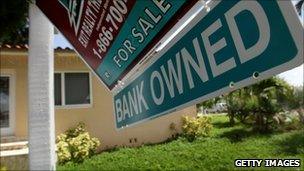Bank of America stops selling repossessed homes
- Published

Repossessions in the US are expected to rise to a record 1.2 million this year
Bank of America (BoA) says it will extend its ban on sales of repossessed homes from 23 US states to all 50 as it looks for possible legal flaws.
BoA, the largest US bank, is checking for omissions in foreclosure documents.
It is the latest move in a growing scandal that has also seen JPMorgan Chase and Ally GMAC Mortgage suspend foreclosures in 23 states.
At the heart of the story lie allegations that foreclosure documents were signed off without proper checks.
BoA is looking into whether homes were being taken back from householders by so-called "robo-signers" and other automated processes, whereby mortgage company employees or their lawyers do not thoroughly verify the information in them.
With banks expected to take over a record 1.2 million homes this year, up from about one million last year, according to the real estate data company RealtyTrac, the foreclosure issue is a hot political potato.
"American families should not have to worry about losing their homes to sloppy bureaucratic mismanagement or fraud," said Senate Banking Committee chairman Christopher Dodd.
He also announced that the committee will hold a hearing next month to look into mortgage servicing and foreclosure processing.
'Accurate decisions'
On Thursday, the Senate Majority Leader, Harry Reid, urged all five large mortgage lenders to suspend foreclosures in Nevada until they have set up systems to make sure homeowners aren't "improperly directed into foreclosure proceedings".
Nevada, where home repossessions are among the highest, is not among those 23 states where foreclosures must be approved by a judge, meaning that the process is relatively swift.
BoA company spokesman Dan Frahm said in a statement: "We will stop foreclosure sales until our assessment has been satisfactorily completed."
But he added: "The basis for our past foreclosure decisions is accurate."